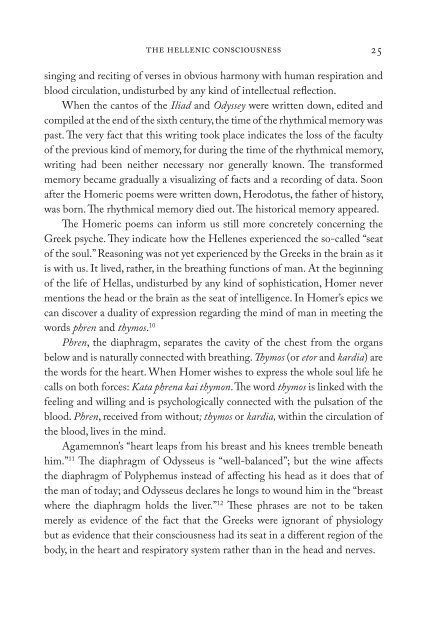The Gospel of Hellas - Research Institute for Waldorf Education
The Gospel of Hellas - Research Institute for Waldorf Education
The Gospel of Hellas - Research Institute for Waldorf Education
Create successful ePaper yourself
Turn your PDF publications into a flip-book with our unique Google optimized e-Paper software.
the hellenic consciousness<br />
singing and reciting <strong>of</strong> verses in obvious harmony with human respiration and<br />
blood circulation, undisturbed by any kind <strong>of</strong> intellectual reflection.<br />
When the cantos <strong>of</strong> the Iliad and Odyssey were written down, edited and<br />
compiled at the end <strong>of</strong> the sixth century, the time <strong>of</strong> the rhythmical memory was<br />
past. <strong>The</strong> very fact that this writing took place indicates the loss <strong>of</strong> the faculty<br />
<strong>of</strong> the previous kind <strong>of</strong> memory, <strong>for</strong> during the time <strong>of</strong> the rhythmical memory,<br />
writing had been neither necessary nor generally known. <strong>The</strong> trans<strong>for</strong>med<br />
memory became gradually a visualizing <strong>of</strong> facts and a recording <strong>of</strong> data. Soon<br />
after the Homeric poems were written down, Herodotus, the father <strong>of</strong> history,<br />
was born. <strong>The</strong> rhythmical memory died out. <strong>The</strong> historical memory appeared.<br />
<strong>The</strong> Homeric poems can in<strong>for</strong>m us still more concretely concerning the<br />
Greek psyche. <strong>The</strong>y indicate how the Hellenes experienced the so-called “seat<br />
<strong>of</strong> the soul.” Reasoning was not yet experienced by the Greeks in the brain as it<br />
is with us. It lived, rather, in the breathing functions <strong>of</strong> man. At the beginning<br />
<strong>of</strong> the life <strong>of</strong> <strong>Hellas</strong>, undisturbed by any kind <strong>of</strong> sophistication, Homer never<br />
mentions the head or the brain as the seat <strong>of</strong> intelligence. In Homer’s epics we<br />
can discover a duality <strong>of</strong> expression regarding the mind <strong>of</strong> man in meeting the<br />
words phren and thymos. 10<br />
Phren, the diaphragm, separates the cavity <strong>of</strong> the chest from the organs<br />
below and is naturally connected with breathing. Thymos (or etor and kardia) are<br />
the words <strong>for</strong> the heart. When Homer wishes to express the whole soul life he<br />
calls on both <strong>for</strong>ces: Kata phrena kai thymon. <strong>The</strong> word thymos is linked with the<br />
feeling and willing and is psychologically connected with the pulsation <strong>of</strong> the<br />
blood. Phren, received from without; thymos or kardia, within the circulation <strong>of</strong><br />
the blood, lives in the mind.<br />
Agamemnon’s “heart leaps from his breast and his knees tremble beneath<br />
him.” 11 <strong>The</strong> diaphragm <strong>of</strong> Odysseus is “well-balanced”; but the wine affects<br />
the diaphragm <strong>of</strong> Polyphemus instead <strong>of</strong> affecting his head as it does that <strong>of</strong><br />
the man <strong>of</strong> today; and Odysseus declares he longs to wound him in the “breast<br />
where the diaphragm holds the liver.” 12 <strong>The</strong>se phrases are not to be taken<br />
merely as evidence <strong>of</strong> the fact that the Greeks were ignorant <strong>of</strong> physiology<br />
but as evidence that their consciousness had its seat in a different region <strong>of</strong> the<br />
body, in the heart and respiratory system rather than in the head and nerves.

















